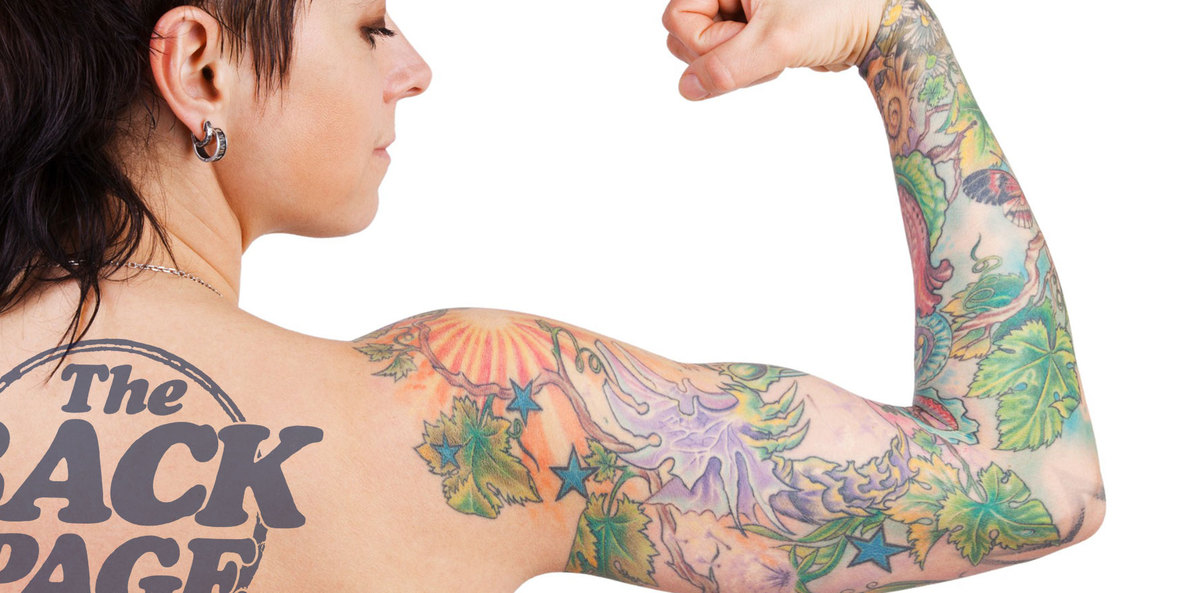Getting some sick-looking ink could potentially make you sick, new research suggests.
“I’ve got your name written here in a rose tattoo,” – lymphoma, after listening to the Dropkick Murphys.
Tattooing has been a thing since Neolithic times. Even Ötzi the Iceman (who lived more than 5000 years ago) had over 50 tattoos. Today, studies estimate between 20 and 30% of people have tattoos of a variety of styles, including roses, pinup girls, barbed wire, the Southern Cross, tribal sleeves, teardrops and Chinese or Japanese symbols or characters.
While your Back Page scribe is a cleanskin (and will remain one for many years to come, if you’re reading, Mum), I can certainly understand the reasoning why many people get tattoos and appreciate the incredible skill tattoo artists have in bringing designs to life.
I can also appreciate some of the more abstract tattoos out there, such as AFL player Tom Liberatore, who has – among other things – characters from The Simpsons, a Cadbury Fruit and Nut bar and a parrot inked on his body.
Libba, it’s time.
— The Front Bar – Wednesday night (@thefrontbar7) March 27, 2024
Let’s talk tattoos.#TheFrontBar pic.twitter.com/Bwk083nuqS
But in a potential blow to skin sticker aficionados, a new study from the University of Lund suggests tattoo exposure may increase your risk of cancer, specifically malignant lymphoma. The findings were published in The Lancet’s eClinicalMedicine.
Researchers sent surveys asking about various body modifications to nearly 12,000 Swedes. About a quarter of participants, identified from the National Cancer Registry, were known to have incident malignant melanoma, while the remainder of the participants were age- and sex-matched controls.
The survey asked a range of questions to respondents with tattoos, the number, size and location of their ink, how old they were when they got their first tattoo and whether their tattoos were done by professional or amateur artists.
Just under half of those invited to take part in the study responded. Twenty-one percent of cancer patients indicated the currently or previously had a tattoo, compared to 18% of controls.
After controlling for age and sex, tattooed participants had a 24% increase in the risk of developing lymphoma. However, this risk decreased slightly and became non-significant when other relevant factors – age, sex, education level, smoking status, marital status and household income – were accounted for (95% confidence interval of the incident rate ratio 0.99-1.48).
“When the tattoo ink is injected into the skin, the body interprets this as something foreign that should not be there and the immune system is activated. A large part of the ink is transported away from the skin, to the lymph nodes where it is deposited,” lead author Associate Professor Christel Nielsen told media.
Many of the chemicals in tattoo inks are deemed to be carcinogenic by the International Agency for Research on Cancer.
The risk of lymphoma was highest in patients who got their first tattoo less than two years before they were diagnosed and decreased over time. This may not be particularly surprising as previous research suggests as much as a third of tattoo ink pigment may end up in lymph nodes within six weeks.
Contrary to their hypothesis, researchers found no evidence to suggest people whose tattoos covered a greater proportion of their total body surface area had a greater risk of developing cancer.
There was also no association between the colour scheme of the tattoo(s) and lymphoma, despite the known variance in chemical makeup of black and coloured tattoo inks.
Interestingly, the data hinted at an increased risk of cancer in patients who had had their tattoo(s) removed, with researchers suggesting the (laser) treatment used to remove tattoos causes the ink to break down into other carcinogenic materials.
Despite these findings, it’s important to remember that this study (a) doesn’t prove tattoos cause lymphoma, and (b) didn’t account for other potential factors that could potentially contribute to someone getting cancer.
“People will likely want to continue to express their identity through tattoos, and therefore it is very important that we as a society can make sure that it is safe. For the individual, it is good to know that tattoos can affect your health, and that you should turn to your health care provider if you experience symptoms that you believe could be related to your tattoo,” recommended Professor Nielsen.
Got a great design or idea for a tattoo? Send it in to penny@medicalrepublic.com.au, who is in the market for some ink.


